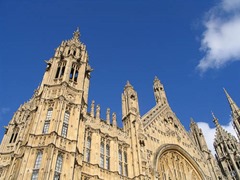Queen’s speech priorities
 A short legislative programme reflects a coalition under pressure from UKIP and slow economic growth.
A short legislative programme reflects a coalition under pressure from UKIP and slow economic growth.
“A Bill will be introduced to give effect to a number of institutional improvements in Northern Ireland” was the most relevant line for the province in the Queen’s speech for 2013-2014.
The Northern Ireland Bill will end confidentiality for political donations in September 2014, abolish dual mandates and make administrative changes to the electoral system. Responsibility for the Civil Service Commissioners, Human Rights Commission and district electoral areas will be devolved. Other proposals will be included if agreed between the main Assembly parties.
The Government’s first priority is to “strengthen Britain’s economic competitiveness”. Deficit reduction and welfare reform will continue to be prioritised. The speech re-affirmed the Budget’s commitment to exempt businesses from the first £2,000 of national insurance contributions.
Plans for a “fairer society where aspiration and responsibility are rewarded” mainly cover England as social policy tends to be devolved elsewhere. Government support for mortgages and deposits is likely to extend across the UK as taxation and financial services policy are not devolved.
The Immigration Bill will increase fines for businesses using illegal labour and require private landlords to check the immigration status of their tenants. Rights to appeal will be restricted and, as a rule, foreign nationals committing serious crimes will be deported.
The Pensions Bill will introduce a single-tier state pension system, replacing the current basic state pension and earnings related top-up from April 2016 onwards. The Bill will apply to England, Scotland and Wales but is likely to be adopted here as parity legislation.
The National Insurance Contributions Bill will establish the £2,000 employment allowance for every business and charity from April 2014. It also aims to stop the use of offshore companies to avoid paying national insurance.
An Intellectual Property Bill is designed to simplify patent-protection laws e.g. by bringing the UK under the EU’s unified patent court. The proposed court will ensure that a single patent application will be valid in most EU countries.
Speaking for the DUP, William McCrea noted that this was one of the shortest Queen’s speeches in recent times. He welcomed tighter rules on immigration but said that the UK should remain a “safe haven” for refugees. McCrea called for an EU referendum before the next general election, which has been ruled out by the Government, and condemned the EU as a “bureaucratic monstrosity”.
SDLP MP Margaret Ritchie welcomed a proposed bill of rights for consumers (in the draft Consumer Rights Bill) but sensed that this was “a programme for government from a coalition that has lost direction and impetus.” Flattering UKIP would “do nothing” for the unemployed or those on low incomes.
Ulster Unionist peer Lord Empey highlighted a compensation scheme for asbestos victims in cases where the liable company cannot be traced. The Care Bill (covering England) aims to stop the “trauma” of older people having to sell their homes to pay for care and he hoped that it would be extended to Northern Ireland. Empey also expected “a great deal of interest” in the draft Consumer Rights Bill which would streamline legislation and provide easier access to compensation when the law is broken.
Newtownabbey-born Labour MP Kate Hoey welcomed the forthcoming debate on the province as part of the Northern Ireland Bill: “All too often now people dismiss Northern Ireland and we cannot get a great deal of discussion about it on the floor [of the House].”





